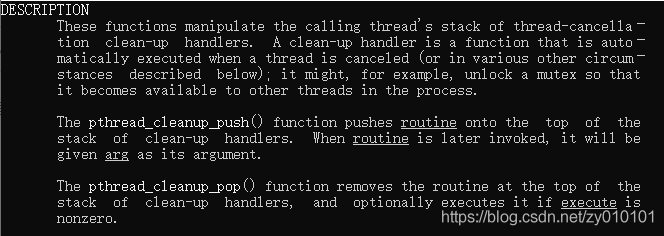看了一会儿,没看懂这个,绝了。书上写的颠三倒四。文档给每个函数两句话。也是没看懂啊!

先把代码试着跑一跑,调试一下,看看结果怎么样。
#include
#include
#include
#include
void cleanup(void *arg)
{
printf("clean...\n");
}
void *My_thread(void *arg)
{
printf("My thread\n");
pthread_cleanup_push(cleanup,"123");
pthread_exit(NULL); //虽然在这里,线程已经结束了,但是下面的pop函数还是得写上。
pthread_cleanup_pop(0);
}
int main()
{
pthread_t tid;
int t = pthread_create(&tid,NULL,My_thread,NULL);
pthread_join(tid,NULL);
return 0;
}
运行结果如下所示:

解释一下,为什么pop函数必须得写上。这是因为它们可以被实现为宏。所以必须在与线程相同的作用域内以匹配的形式使用push函数和pop函数。pthread_cleanup_push的宏定义可以包含字符{,而pthread_cleanup_pop的宏定义必须有相对应的匹配字符}。
在Ubuntu16.04下,pthread_cleanup_push和pthread_cleanup_pop被实现为宏。当我们注释掉pop函数调用之后,再次编译,会发现报错如下:

当你发现这个错误,却无可奈何的时候,你甚至像我一样,检查了好几遍自己的代码。发现没有意料之外的结尾,所有的{}都是成对出现的。殊不知是pthread_cleanup_push和pthread_cleanup_pop被实现为宏。而且含有匹配的{}。
—————————既有趣,又很烦人的坑—————————
下面给出这两个宏的定义,就可以很直观的看到到底是怎么回事。
# define pthread_cleanup_push(routine, arg) \
do { \
__pthread_unwind_buf_t __cancel_buf; \
void (*__cancel_routine) (void *) = (routine); \
void *__cancel_arg = (arg); \
int __not_first_call = __sigsetjmp ((struct __jmp_buf_tag *) (void *) \
__cancel_buf.__cancel_jmp_buf, 0); \
if (__glibc_unlikely (__not_first_call)) \
{ \
__cancel_routine (__cancel_arg); \
__pthread_unwind_next (&__cancel_buf); \
/* NOTREACHED */ \
} \
\
__pthread_register_cancel (&__cancel_buf); \
do {
extern void __pthread_register_cancel (__pthread_unwind_buf_t *__buf)
__cleanup_fct_attribute;
//到这里,pthread_cleanup_push宏定义完了,而这个嵌套的do...while循环没完。
//它还有一半在pthread_cleanup_pop宏之中。
/* Remove a cleanup handler installed by the matching pthread_cleanup_push.
If EXECUTE is non-zero, the handler function is called. */
# define pthread_cleanup_pop(execute) \
do { } while (0);/* Empty to allow label before pthread_cleanup_pop. */\
} while (0); \
__pthread_unregister_cancel (&__cancel_buf); \
if (execute) \
__cancel_routine (__cancel_arg); \
} while (0)
extern void __pthread_unregister_cancel (__pthread_unwind_buf_t *__buf)
__cleanup_fct_attribute;
在此之前,我还是个孩子,从来没有想过宏定义还能这样玩。程序界的前辈又给我上我一课。
好了,言归正传。我们接着看这两个宏到底怎么使用。把线程函数改为如下:
void *My_thread(void *arg)
{
printf("My thread\n");
pthread_cleanup_push(cleanup,"123");
pthread_cleanup_pop(1); //非0参数
pthread_exit(NULL);
}
运行结果如下:

然后继续更改线程函数如下:
void *My_thread(void *arg)
{
printf("My thread\n");
pthread_cleanup_push(cleanup,"123");
pthread_cleanup_pop(0); //0参数
pthread_exit(NULL);
}
运行结果如下:

下面取消线程函数,更改代码如下:
void *My_thread(void *arg)
{
pthread_setcanceltype(PTHREAD_CANCEL_ASYNCHRONOUS,NULL); //设置取消线程立即生效
printf("My thread\n");
pthread_cleanup_push(cleanup,"123");
pthread_cancel(pthread_self()); //取消该线程
printf("线程执行不到这里\n");
pthread_cleanup_pop(0); //0参数
}
运行结果如下:

没有打印“线程执行不到这里”这句话。
上述代码中得pthread_self()函数是用来获取正在调用它得线程的ID。而pthread_setcanceltype()函数是用来设置线程取消立即生效的,否则线程取消不是立即生效的。演示如下:
void *My_thread(void *arg)
{
//pthread_setcanceltype(PTHREAD_CANCEL_ASYNCHRONOUS,NULL);
printf("My thread\n");
pthread_cleanup_push(cleanup,"123");
pthread_cancel(pthread_self());
//sleep(1); //这个取消不是立即生效的,所以加上sleep(1)。也就是说,反正一切小心
printf("线程执行不到这里\n");
//pthread_exit(NULL); //虽然在这里,线程已经结束了,但是下面的pop函数还是得写上。
pthread_cleanup_pop(0); //0参数
// pthread_exit(NULL);
}
运行结果如下:

取消没有立即生效,仍旧打印了“线程执行不到这里”这句话。
既然说到这里了,这个pthread_cancle()函数真是绝了,和这个push,pop宏也差得不多。后面的文章再说这个cancle函数吧。
总结:清理函数是由push函数调度的。
调用pthread_exit()结束线程时;
响应取消线程请求时;
用非0的参数调用pthread_cleanup_pop()时。
当然了,无论什么情况,当pthread_cleanup_pop(0)被调用,那么清理函数将不会起作用。同时需要注意,一个线程可以有多个清理函数。清理程序记录在栈中。因此,一次pop只能取消最近一次的push。这也意味者它们的执行顺序和push注册的顺序是相反的。
本文同步分享在 博客“zy010101”(CSDN)。
如有侵权,请联系 support@oschina.cn 删除。
本文参与“OSC源创计划”,欢迎正在阅读的你也加入,一起分享。





















 983
983











 被折叠的 条评论
为什么被折叠?
被折叠的 条评论
为什么被折叠?








